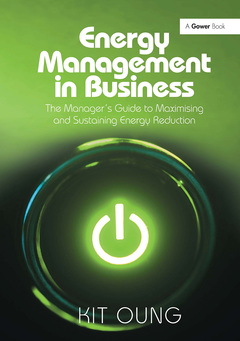Energy Management in Business The Manager's Guide to Maximising and Sustaining Energy Reduction
Auteur : Oung Kit

Date de parution : 06-2024
17.4x24.6 cm
Date de parution : 01-2013
17.4x24.6 cm
Thèmes d’Energy Management in Business :
Mots-clés :
reduction; programmes; projects; opportunities; efficient; behaviours; quick; win; simple; payback; MIT Sloan Management Review; Young Man; Energy Reduction Programmes; Energy Reduction Opportunities; Energy Savings; Energy Reduction Projects; Room Set Point Temperature; Real Life Manufacturing Environment; Energy Balance; Ozone Layer Depletion; Energy Conservation; Energy Reduction; Energy Efficiency; Energy Efficient Behaviours; Energy Performance Indicator; Quick Win Opportunities; Vice Versa; Business Case; Energy Systems; CHP Plant; Degree Day Data; Expected Energy Consumption; Actual Carbon Content; Quick Wins; Business Processes


